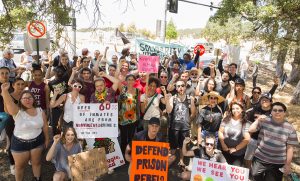
Isolated prisoners launched their strike on 25 May to protest the inhumane conditions in which they are held in solitary confinement. The prison administration has refused to address their just and legitimate demands and has instead responded with increased repression.
The Prisoner Hunger Strike Solidarity Coalition reported that “we cannot say exactly how many people are refusing meals, but we know that there are roughly 30 people in the unit that announced the strike.”
Samidoun expresses its strongest support for the strikers and their demands, and for the struggle in the United States against racist oppression and mass incarceration. We salute those fighting for their lives and human dignity in a prison system based on racism, injustice and exploitation.
The strikers’ demands in Folsom include adequate access to courts, legal assistance, education, rehabilitation, televisions, and appropriate recreation equipment, an end to noisy “welfare checks,” properly packaged food and toiletries at the commissary (prison store), and appropriate clothing and food bowls and cups.
The strikers declared in the announcement of their strike:
“[M]en stand again [as Pelican Bay SHU prisoners did in the 2011 and 2013 mass hunger strikes], just as unified, ready to sacrifice their bodies, health and life to achieve what has already been hard fought for and accomplished. Why must California prisoners continue to sacrifice health and life, involve lawyers and courts, in order to be treated like human beings? We will continue to remind CDCR officials they will be held accountable for this type of treatment.
“Prisoners in B4 ASU are forced to sit or stand idle in their cells or yard cages without meaningful exercise, education or rehabilitative programs. We are already forced to endure atypical and significant hardships due to being in segregated housing and solitary confinement. When taken together, these conditions constitute cruel and unusual punishment under the U.S. Constitution.
“We are being deprived of basic human needs, including normal human contact, environmental and sensory stimulation, mental and physical health, entertainment, physical exercise, sleep, access to courts, and meaningful activity. Prolonged exposure to these deprivations has caused and will cause serious physical and psychological harm.”

To support the prisoners, contact California officials, an action called for by the Prisoner Hunger Strike Solidarity Coalition, working together with the strikers in Folsom:
- Folsom Prison Warden Ron Rackley: 916-985-2561 or ronald.rackley@cdcr.ca.gov
- Chief Deputy Inspector General Roy Wesley: 916-255-1102
- Ombudsman Sara L. Smith (the person who is supposed to check on welfare, investigate complaints etc.): 916-324-5458 or sara.smith@cdcr.ca.gov
- CDCR Secretary Scott Kernan: scott.kernan@cdcr.ca.gov
- CDCR Undersecretary Ralph M. Diaz: ralph.diaz@cdcr.ca.gov
- Jerry Brown: 916-445-2481
- Chief Officer of the Ombudsman Sara Malone: 916-327-8467 or sara,malone@cdcr.ca.gov
- Folsom Prison Public Information Officer Jack Huey: 916-985-2561 jack.huey@cdcr.ca.gov
Sent to a secretary or voicemail? Leave a message for the official you are trying to contact.
First time calling in? You can find a detailed guide here.
SAMPLE SCRIPT FOR PHONE CALL OR EMAIL:
“Hello, my name is ____________and I’m a resident of _______(name your state). I am calling in support of the hunger strike that began May 25th at Folsom State Prison. I am deeply concerned about the cruel and inhumane conditions of confinement that have brought this on. I strongly urge you to meet the Hunger Strikers’ reasonable human rights demands, and do not retaliate against them.”
This story previously appeared on The Dawn News and originally on Samidoun.
Palestine celebrates the victory achieved by political prisoners
After 40 days of hunger strike, Palestinian prisoners got the Israeli occupation authorities to finally bow to their demands. Last Saturday, May 26 – the first day of Ramadan – Palestinian prisoners ended their hunger strike.
The chief of the committee in charge of Palestinian prisoners explained that around 4 a.m. Saturday, detainees, led by Marwan Barghouti, announced the end of the hunger strike. They reached an agreement with the occupation penitentiary forces after over 20 hours of negotiations in the Ashkelon prison.
Almost 1,600 Palestinian detainees went on hunger strike as a protest against the appalling conditions of detention.

Celebrations
Celebrations erupted in the Palestinian territories for the prisoners’ victory. People went out on the streets waving flags and singing songs. On social media, there were congratulations to the 40-day hunger strike.
The strikers demanded better health services, family visits, the end of isolation treatment and more humane detention conditions.
At first, the occupation authorities refused to negotiate with the political prisoners. However, their massive commitment to this form of peaceful protest generated an international wave of solidarity and criticism of the Israeli regime.
Around 30 prisoners had to be hospitalized over the last few days due to the impact of the hunger strike on their health, according to the penitentiary administration.
Palestinian expert Abdel Mayid Suilem says this is a victory of prisoners over the occupation forces. “Israeli authorities, who were firmly against negotiating with the representatives of detainees, were forced to do so,” he said to AFP. “It now remains to be seen whether Israel will honor its commitments,” he added.
Prisoners turned the eyes of the world on the detention conditions of the 6,500 Palestinians imprisoned by the Zionist entity, including children, and denounced the Israel legal system, which is forced onto Palestinians living in the Israeli-occupied territories.
The destiny of prisoners is a sensible issue for Palestinians, since over 850,000 of them – out of a total population of 4.5 million – have been in Zionist prisons since the occupation of their lands in 1967.
This story previously appeared on The Dawn News and originally on Al Manar.





